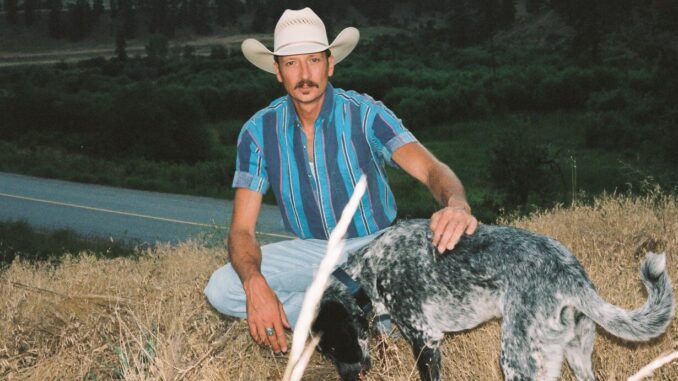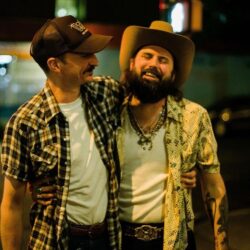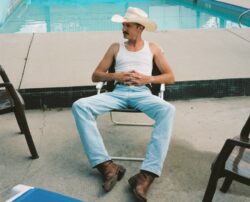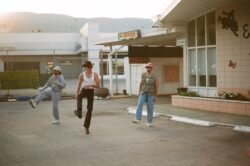
Drop the needle on the record and don’t skip any songs.
Bob Sumner may have gone solo but he craves companionship, whether in relationships, buddies, songs or beers. It’s all there for anyone to see on “Some Place to Rest Easy”, his second album after he and his brother Brian called a temporary halt to The Sumner Brothers act. “We’re not calling it a break-up,” he reasoned, as they are looking around for grant money to fund a possible future reunion.
Brian is three years the elder brother, one Bob always looked up to for his strong sense of individuality and being unafraid to push boundaries. “That seeped into me so when I wanted to throw synthesizers onto my record, it was okay,” he said. “We wrote songs individually and then brought them to the band, so going out on my own wasn’t something I was unprepared for. These days Brian is into instrumental guitar stuff. He was divorced a while ago and holed up in his apartment for two weeks writing all the songs for an album. That was his mourning process.”
Well, what about the companionship of friends? Etienne Tremblay provides the guitar fills on the record that are as sonically tasty as a Japadog, that unique Vancouverite combination of hot dog and Japanese cuisine. “Etienne and I were living together, and we’d sit around the kitchen table playing our guitars and wound up co-writing several of the songs on the album.”

Another buddy, Willy Tea Taylor helped out on ‘Is It Really Any Wonder’ by coming up with the line “There stands your philosopher, shaking hands with your poet, They’ve been standing in your shadows, but ya didn’t even know it Where lightning meets thunder, is it really any wonder at all?” That was stirred and shaken during a virtual drinking party on Zoom during the pandemic.
And there’s the young kid that Sumner hired to help out with the thirty horses on the two-hundred-acre farm in rural British Columbia where he worked for two years. “I swear he was like a human jukebox the way he could pick out tunes without ever hearing them before. I was all by myself in a little loft apartment above the stalls before he showed up. Ilya Zalubniak is kind of bashful and works as a cowboy now someplace in the interior. He co-wrote ‘You Can Stay Here’ and also ‘A Thousand Horses,’ which was everyone’s favourite song on “Wasted Love Songs”. Maybe I’ll put one of his songs on each record for the rest of my days.”
What lies beneath the surface is the ineffable story of Sumner’s two friends who suffered alcoholism-related deaths prematurely. Three of the songs on “Some Place to Rest Easy” deal with these tragedies in one way or another. ‘Bridges’ and ‘Motel Room’ were both written while one of his friends was still alive. He could painfully see the changes taking place while crashing on the friend’s couch after a night of partying. “I could look into his bedroom past the open door and see him taking a swig from a fifth of vodka before crawling under the covers. He’d wake up in the morning and take another swig before getting out of bed. It’s a helpless place to be watching that happen to someone you care about.”

‘Is It Any Wonder’ was written while another friend was having the same kind of problem. “He was no longer drinking to have a good time,” Sumner recalled. “It became the medicine he needed to get through the day.” There’s a video of Sumner on his Facebook page that shows him holding a bottle of booze while someone was recording the scene. “We were having a good time making up funny commercials for the hell of it before things got out of control. Each one of my friends struggled terribly with mental illness, with depression and anxiety, with loving themselves. In the end, I know the alcohol never gave them a chance. “There’s a bottle at your bedside, Your faithful soldier, You’ve lost this battle, But the war ain’t over, You may drown your sorrows But they will wash up on the shore, Is it really any wonder?”
Life is for the living as the saying goes, and Sumner is all about living these days after getting his own problem with alcohol under control. He’s put a lot of time, sweat and money into this new album and has looked to Nashville as a place to gain wider recognition.
There’s a vibrant Americana scene in Canada that has flourished in the past two decades, the sons and daughters of Joni Mitchell, Neil Young and Leonard Cohen putting out some of the best music that not enough people in America have heard. Sumner, who comes from the little suburban British Columbia town of White Rock, is making a pitch on his third solo album, “Some Place to Rest Easy”, which retains the best parts of The Sumner Brothers’ music while adding some personal touches that reflect his interest in ambient sounds.
“In Vancouver, you’re going to have a lot of dark, gray days and more rain than you can imagine,” Sumner said. That’s probably why I love ballads and listening to ambient artists like Brian Eno and Arvo Part, especially with my morning coffee.”
On those precious few days where cloudless skies form a dome over Vancouver, Sumner imagines being a trucker going down the highway with the window down listening to Randy Travis or Kelsey Waldron. “Driving is always paired with music,” he offered, “even if it’s taking a turn to go down some road just to find out where it leads you.”
Sumner packs his songs with country-rock twang and rambling riffs, which should appeal to fans not only of Willie and Waylon but to those of the Avetts and Adrienne Lenker. You’ll hear countrypolitan strings alongside ambient sensibilities; tasteful synth timbres followed seamlessly by tracks featuring dobro and steel guitar.
Eric Nielsen, bassist with the band City & Colour, produced all three of Sumner’s solo albums and brought in his bandmates, drummer Leon Power and multi-instrumentalist Matt Kelly, whose pedal steel, Wurlitzer and organ recall the brilliance of Garth Hudson, to serve as the studio band with guitarist Tremblay.
Sumner’s lyrics continually circle back to emotional topics such as heartbreak, loss of self-esteem, and longing for friendship, even from those departed. ‘Lonesome Sound’ is one of the catchiest woe-is-me songs in ages, with some off-kilter guitar from Paul Rigsby of Neko Case’s band to match its head-sticking hooks. The twangy aforementioned ‘Motel Room’ grooves like a dirt road country song and should appeal to fans of contemporary indie-country acts like Dougie Poole while ‘Didn’t We Dream’ might be the best song Steve Earle never wrote.
“It’s a companion piece of sorts to ‘Don’t We Though.’ Sumner muses about having vivid dreams of a bright future replete with the apparitions of joyful children and contented grandparents – “Yes, we had dreams, our little ones come runnin’ and the old folks sit there smiling”. Images of an idyllic home nestled in a pristine country – “Didn’t we dream, every kind of beauty, where the mountains meet the valley”.
“That’s Steve Fuckin’ Earle. Etienne and I have listened to a lot of Steve Earle over the 7 or 8 years we’ve been playing together. I love that shotgun snare he uses like on the records from the ‘80s and ‘90s. Steve cares about the meat of a song; he cares about the words, the story, the poetry. ‘Didn’t We Dream’ isn’t ‘Copperhead Road’ but we did throw in a loose mandolin a la Earle, and my friend Elliot C. Way helped beef up the chorus with the line “We had Kings, Queens and Aces’, like a shotgun out of the gates kid, we set the pace didn’t we. But there was always tomorrow, you can beg steal and borrow, but if you don’t got the follow through …” .

Need he say more? It don’t mean a thing if it ain’t got that follow-through swing. Sumner claims to be a ballad, ambient, gentle music kind of guy, but he also knows where bread is buttered. “I want people to drop the needle and not skip a song on my record,” he admits, and it helps to have music that swings like baseball megastars Aaron Judge and Shohei Ohtani whacking one out of the park.
‘Forty Years on the Floor’, however, has an easy, languid, grooviness to it, that is, save for when a barely audible synth builds in the background. Sumner asserts the song is a meditation on life. It grooves. It weaves. It contemplates. It fades out and leaves you with your ruminations. “This is the closest I’ll ever get to a Grateful Dead vibe. I don’t typically go in for a lot of jamming or noodling. I dig hooks. But man did we get a nice loose thing going. I love the interplay between Etienne Tremblay on guitar and Chris Gestrin on keys. Two musicians at the top of their game, comfy as all hell riffing off one another.”
Sumner found motivation for the record in Rick Rubin’s audiobook, “The Creative Act.” His takeaway from it was that he needed to make music he would be proud to show his best friend. On that score, one can only wonder what his three-legged Mexicali mutt, Endo, would have to say if Sumner’s dream of taking his dog out on tour with him became a reality.
He’d probably bring Endo along to California, the place where fond memories exist of times his mother would bring him along to visit friends and relatives. “The California girls were so beautiful on the beach where kids were riding bikes. Just seeing the palm trees, freeways, fast food joints, all my fantasies rolled into one place.” One that’s much sunnier than Vancouver, that’s a given. He wrote a song about the Golden State that never made it onto the album. ‘California’ is a country crooner that begins “Sittin’ here in this gray town, wishin’ I could get gone, but I don’t have no money, how I wish I had some”.
Well, if you want to make some money in the music business, maybe you turn to the advice once given to him over lunch with an industry professional who works with acts like Elvis Costello and Ry Cooder. To hear Sumner tell it, the fellow had a way of cutting through the crap as if he was using the sharp edge of a snowboard, “Get out of Canada. It’s a beautiful country but a wasteland in that there’s not a lot of opportunity, especially in Vancouver.”
Sumner has been to Nashville and loved his time there, the small-town feel of the city and the excellence of the many musicians. “I’d love to one day have Randy Travis produce my record. His production feels like a warm, comfortable blanket.”
He likes the idea of making a difference with his songs. “I always want people to feel something,” Sumner explains. “If I heard that this album helped somebody that was feeling down, even just by feeling some other emotion for a little while, that’s the number one thing for me.”
To do that, though, the songwriter needs to have an eye for a moment in time, a narrative that grips the listener, something that sticks with you. Take ‘Ticket to Ride,’ not the Beatles classic but a sorrowful tale of something Sumner saw while stopping for gas and smokes at a convenience store. It’s a song he’d previously recorded twice with The Sumner Brothers, and it also served as the closing track on “Wasted Love Songs.”
“It was one of those winter nights in Vancouver with the snow blowing sideways. Inside, a homeless couple had apparently scrounged up enough change to buy a keno ticket, but the attendant wouldn’t allow them to wait inside for the result. I saw them outside, faces pressed against the window glass, muttering ‘You never know. You never know.’ ”
That must have been a chilling scenario for Sumner in more ways than the one the homeless couple suffered. It could have been seen as a not-so-subtle reminder of the dangers that continued alcoholism brings, including loss of everything you hold dear. That he was able to see through this filmy lens and find some light is a testament to his strength. It will serve him well whether his career in music continues in sunny Music City or grayish Raincouver.


